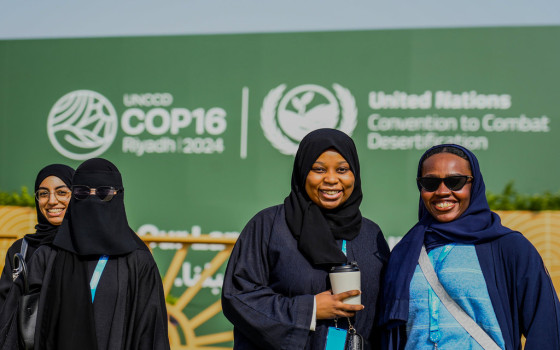Three billion people around the world are affected by the problem of desertification.. A UN conference in Riyadh

- Europe and Arabs
- Tuesday , 3 December 2024 9:0 AM GMT
Riyadh - New York: Europe and the Arabs
The Saudi capital, "Riyadh", is hosting the United Nations Conference on Desertification, Drought and Land Reclamation. At the opening, the conference president, the Saudi Minister of Environment, Water and Agriculture, indicated that three billion people around the world face the effects of land degradation, which "will increase levels of migration, instability and insecurity in many societies." According to what was stated in the daily UN news bulletin, a copy of which we received on Tuesday morning,
The Saudi Minister, Abdulrahman Al-Fadhli, was speaking at the launch of the 16th session of the Conference of the Parties to the United Nations Convention to Combat Desertification, which the Convention Secretariat describes as "an important moment to raise global ambition and accelerate action on land and drought resilience through a people-centered approach."
Globally, up to 40 percent of the world's land has been degraded, meaning that its biological or economic productivity has declined. This has dire consequences for climate, biodiversity and people's livelihoods.
Droughts, a priority issue at the conference, have become more frequent and severe, increasing by 29 percent since 2000 due to climate change and unsustainable land management.
Caring for Humanity
The UN Convention to Combat Desertification was agreed 30 years ago and the organization’s current Executive Secretary, Ibrahim Thiaw, highlighted the continuing importance of restoring land lost to drought and desertification.
“Land restoration is primarily about caring for humanity itself. How we manage our land today will directly determine the future of life on Earth,” he said. Speaking from his personal experience meeting farmers, mothers and young people affected by land loss, he added: “The cost of land degradation touches every corner of their lives.”
“They see it in rising grocery prices, in unexpected energy surcharges, and in the increasing pressure on their communities. Loss of land and soil robs poor families of nutritious food, and a secure future.”
Reversing land degradation
The 16th Conference of the Parties (COP16) provides an opportunity for global leaders from governments, international organizations, the private sector and civil society to come together to discuss the latest research and chart a path forward towards a sustainable future for land use.
Mr Thiaw said that together the world can “reverse the trends of land degradation,” but only if “we seize this pivotal moment.”
In a video address to the conference, UN Deputy Secretary-General Amina Mohammed urged delegates to do their part and “turn the tide” by focusing on a number of priorities, including strengthening international cooperation.
She stressed the need to step up restoration efforts and work to “mobilize collective funding.”
Funding these efforts will be difficult and is unlikely to come from the public sector alone, but according to the UN Deputy Secretary-General, “cumulative investments must total $2.6 trillion by 2030. This is what the world spent on defense in 2023 alone.”
Tahaniyat Naim Satti, speaking on behalf of civil society organizations to the conference, called for “ambitious and inclusive action,” adding that “the meaningful participation of women, youth, indigenous peoples, pastoralists and local communities in decision-making at all levels must be institutionalized.” “Their insights and lived experiences are essential to shaping policies that effectively address land degradation and promote sustainable land management and restoration,” she stressed.
The conference is scheduled to run until 13 December, and there will be some intense discussions and negotiations as delegates push for the following outcomes.
Accelerate the restoration of degraded lands by 2030 and beyond
Strengthen resilience to droughts and intense sand and dust storms
Restore soil health and increase nature-positive food production
Securing land rights and promoting equity for sustainable land stewardship
Ensuring that land continues to provide solutions for climate and biodiversity
Unleashing economic opportunities, including decent jobs for young people
Fast facts: The UN and desertification
Three decades ago, in 1994, 196 countries and the European Union signed the United Nations Convention to Combat Desertification.
The Conference of the Parties is the main decision-making body of the UNCCD.
The Convention is the global voice for land, where governments, businesses and civil society come together to discuss challenges and chart a sustainable future for land.
The 16th session of the Conference of the Parties to the United Nations Convention to Combat Desertification (COP16) will be held in Riyadh, the capital of the Kingdom of Saudi Arabia, from 2 to 13 December. The Convention is one of the three “Rio Conventions” along with the United Nations Framework Convention on Climate Change and the Convention on Biological Diversity. It is an outcome of the historic 1992 Earth Summit held in Rio de Janeiro, Brazil.














No Comments Found